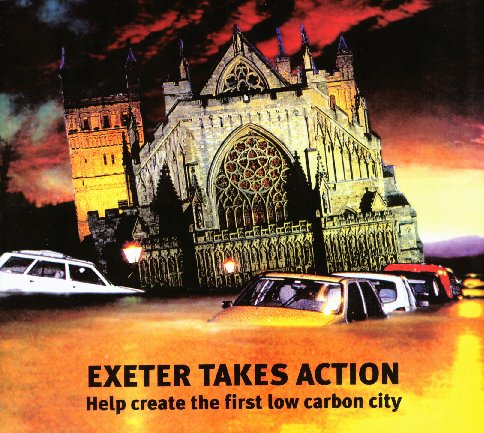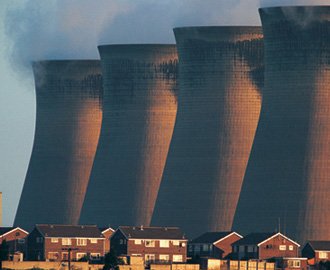
Local Action to STOP Climate Change
Campaigning for Exeter to be the world’s first "Low Carbon City" |

Exeter Climate Action is a bold initiative to put Exeter on the world stage in its endeavours to stop dangerous climate change. The recent international conference (February 2005) on Climate Change held at Exeter’s Met Office came to the dramatic conclusion that the world is on the brink of the "point of no return".As a civilisation we probably have 15, maybe 25 years, to transform to a low carbon society. This is going to be humankind’s biggest global challenge this century. And Exeter is going to show the world how to do it. However, this is not going to work unless the whole Exeter community works together in this project. Everone can, and indeed must, play their part. Exeter: Low Carbon City:Exeter Climate Action is bidding to make Exeter the world’s first Low Carbon City. What does this mean? We intend to reduce CO2 emissions in Exeter by 25% before 2015, by 50% by 2020, by 75% before 2025, and 90% by 2030. No other city is setting itself such an ambitious challenge.But if we are to face up realistically to the climate change threat then a target like this is the only one that makes sense. We have to live in the Real World. Log on and get active: One thing that anyone can do is to log on to this website and make a personal commitment to stop climate change. Everyone that does this, gets to see their name in the website "Hall of Fame"; a community of people that are actually doing something to combat climate change, and making a joint proclamation of their commitment.
One thing that anyone can do is to log on to this website and make a personal commitment to stop climate change. Everyone that does this, gets to see their name in the website "Hall of Fame"; a community of people that are actually doing something to combat climate change, and making a joint proclamation of their commitment.
Campaigning against Climate Irresponsibility:But it doesn’t stop there. Exeter Climate Action aims to expose all those companies and authorities which are acting irresponsibly, and doing everything to increase carbon dioxide emissions. One such company is Land Rover. If you go to their showroom in Matford Business Park, you will notice that every single vehicle displayed is a "Climate Killer". Every car there comes into the government's worst category of carbon emissions of over 180g/km.We have added Matford Land Rover to the website "Hall of Shame". We will not rest until buying a car from here becomes a matter of public shame, or until the place is closed down. Such showrooms are blatantly damaging the biosphere, and destroying our future. And there are other car show rooms that are almost as bad as Land Rover’s. 4x4s - Our Immediate Focus:There is no doubt that the worst vehicles on the road at the moment are 4x4s. These urban monsters are a growing plague on our streets, and they are the most inefficient vehicles you can buy. Our intention is to drive them off the road. Our ulimate aim is that these vehicles become an object of shame, and that no Exeter citizen buys these climate killers.Our "Urban 4x4 SWAT Team" will carry out regular forays onto the streets and car parks informing drivers of 4x4s that they have made a "poor vehicle choice", and that they must change their ways. Growing Air Travel:Another big challenge for us all is to reduce the damaging explosion of air travel. In 2005/6, Exeter International Airport increased their annual passenger numbers from 670,000 to 874,000. This makes the airport the worst carbon polluter in the Exeter area. Travelling by air is the most damaging way to travel. For example, a return trip from the UK to New York emits carbon dioxide equivalent to a whole year’s motoring.We are not saying that people should not travel by air, but that they should only fly if there is no better way to travel. We aim to reduce passenger movements at Exeter Airport to about 250,000 per year. This might seem an impossible target, but there really is no serious alternative. International Climate Change Taskforce "Meeting the Climate Challenge": This report (dated January 2005) sets out that climate instability is likely to occur if global temperatures rise to 2 degC above pre-industrial levels. At the moment they are 0.8 degC above.
This report (dated January 2005) sets out that climate instability is likely to occur if global temperatures rise to 2 degC above pre-industrial levels. At the moment they are 0.8 degC above.
This level is likely to happen when concentrations of CO2 reach 400ppm. At the moment the concentration is 380ppm rising from 280ppm in 1750. We are likely to reach 400ppm within the next 2 decades.
What actions we take now will only start to take acount in 40 or 50 years time. Thus the actions we take in the next two decades will not have any real effect until the end of the century.
Climate Change Forum:We are hoping to set up a Climate Change Forum in conjunction with Exeter City Council and Devon County Council. This will become the main vehicle for deciding on the necessary policy changes that will be required to meet the "Low Carbon City" challenge. The encouraging sign is that both these authorities have signed up to the Nottingham Declaration on Climate Change, which requires each authority to publicly set out a whole raft of measures to meet the climate challenge.We will need the wholehearted support and commitment of our Local Authorities. At the moment though they are failing to show leadership. That must change. Arctic Climate Impact Assessment: This report came to the conclusion that polar bears could be extinct by 2100 if we allow the Arctic to melt at its current rate. Temperatures in the Arctic are rising at twice the global average rate and could leap by 7 degrees by the end of the century.
This report came to the conclusion that polar bears could be extinct by 2100 if we allow the Arctic to melt at its current rate. Temperatures in the Arctic are rising at twice the global average rate and could leap by 7 degrees by the end of the century.
Robert Corell of the American Meteorological Society said that the Arctic "provides a bellwether of what is coming to planet Earth".
Climate Conference:We will be holding a Conference in Exeter. Called "How we Stop Climate Change", we are inviting the Arctic Explorer Pen Hadow to give the keynote address. He has first-hand experience of how humankind is causing the Arctic to melt at alarming rates.The Conference will have two major impacts. To demonstrate the scientific consensus about the serious situation we are in, and to chart a way out of this predicament. Radical 10 Point Traffic Action Plan:It must be clear to everyone that Exeter, over the past 10 years, has experienced a massive increase in traffic. This is due in part to its economic success, but is also the result of deliberate planning policies to increase business and industrial developments in Exeter.This has resulted in 35% of Exeter’s workpeople travelling into Exeter, thus creating commuter queues every morning and evening. This is more than any other city in the South West. As a result Exeter regularly features in the top ten of the UK’s polluted cities. As there is no industry to speak of in Exeter, this is wholly down to traffic. Something has to be done. And it has to be radical. Tinkering at the edges will make little difference. We suggest the following:
The Bottom Line: The bottom line in all of this is that, as a nation, we need to reduce our emissions of greenhouse gases by about 60% to 85% over the next 20 years or so. (This is about 3% less every year).
The bottom line in all of this is that, as a nation, we need to reduce our emissions of greenhouse gases by about 60% to 85% over the next 20 years or so. (This is about 3% less every year).
Put like this it doesn’t sound too difficult. However, at the moment the UK is increasing emissions by 2% a year. We are going in the opposite direction.
It is important to understand why our society is not progressing on Climate Change initiatives. There are two reasons for this:
The log jam needs to broken. And that is what Exeter Climate Action aims to do. Over the coming years it is our commitment to break this log jam, and enable Exeter to become the model Low Carbon City. We will be looking for your support and commitment also.Click here to make a commitment to change the climate for the better."No one was so foolish as to do nothing because they could only do a little" |
Latest Update:
|
Web page updated by Maurice Spurway - Exeter FoE
|
